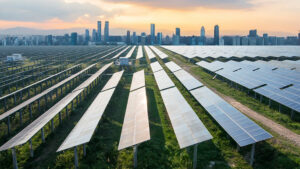Singaporean RE developer eyes $300-M investment in Philippines
SINGAPORE-BASED renewable energy (RE) developer Gurīn Energy plans to invest approximately $300 million (around P17 billion) in the Philippines to develop one gigawatt (GW) of RE projects over the next two to three years.

By Sheldeen Joy Talavera, Reporter
SINGAPORE-BASED renewable energy (RE) developer Gurīn Energy plans to invest approximately $300 million (around P17 billion) in the Philippines to develop one gigawatt (GW) of RE projects over the next two to three years.
“We finance our projects, generally with local banks. We have a very good partnership with a number of Filipino banks. [For a] gigawatt, we would probably be investing around $300 million,” Gurīn Energy Chief Operating Officer Robert Driscoll told BusinessWorld on the sidelines of the blessing ceremony for its 75-megawatt (MW) Palauig Solar Power Project in Zambales on Friday.
Last week, the company held a blessing ceremony for its first operational project in the Philippines, valued at $60 million (approximately P3.5 billion).
The solar farm features 136,363 ground-mounted, energy-efficient solar photovoltaic panels. It is expected to generate enough clean energy to offset 53,100 metric tons of carbon emissions annually, according to the company.
The project is owned by Shizen, Inc., a wholly owned subsidiary of Gurīn Energy.
Construction began in the first quarter of 2024, with testing and commissioning commencing in December. The project is awaiting a final permit for full commercial operations, targeted within the first quarter, Mr. Driscoll said.
Gurīn Energy currently has a portfolio of 7 GW of solar, wind, and energy storage projects at various stages of development across Indonesia, Singapore, Thailand, the Philippines, South Korea, and Japan.
According to Mr. Driscoll, the company’s investment decision was driven by the Philippine government’s “solid commitment” to renewable energy through the Renewable Portfolio Standards (RPS).
RPS mandates distribution utilities, electric cooperatives, and retail electricity suppliers to source a portion of their energy supply from eligible renewable energy resources, fostering the growth of the country’s renewable energy industry.
“The fact that the marketplace is open and competitive so that we have multiple parties that we can discuss offtake with versus a single offtake as we see in some of the other countries,” he said.
Gurīn Energy has partnered with Aboitiz Power Corp.’s retail electricity supply unit as the offtaker for the solar power project.
“I think there is a really crying need for expansion of renewable energy in the Philippines to deal with the crisis of climate change, and the Philippines is one of the countries that is among the most vulnerable to climate change and the impacts of climate change with changes in weather and the intensity of storms and flooding,” said Mr. Driscoll.
“So increasing renewable energy and decreasing the reliance on fossil fuel is something that’s important for the Philippines from a climate change perspective,” he added.
The Philippines aims to increase the share of renewable energy in its national power generation mix to 35% by 2030 and 50% by 2040.











